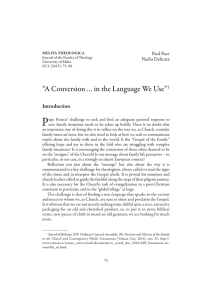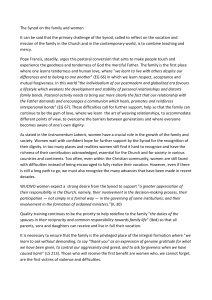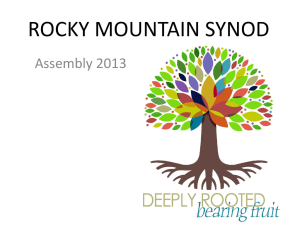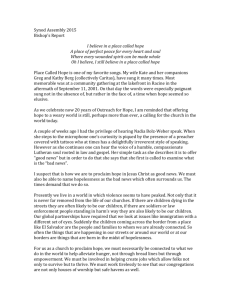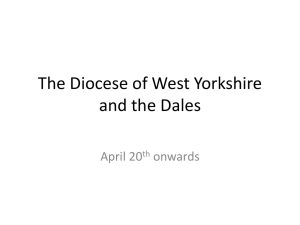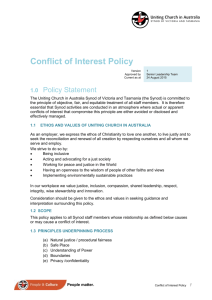Report from the Synodical Bishop
advertisement
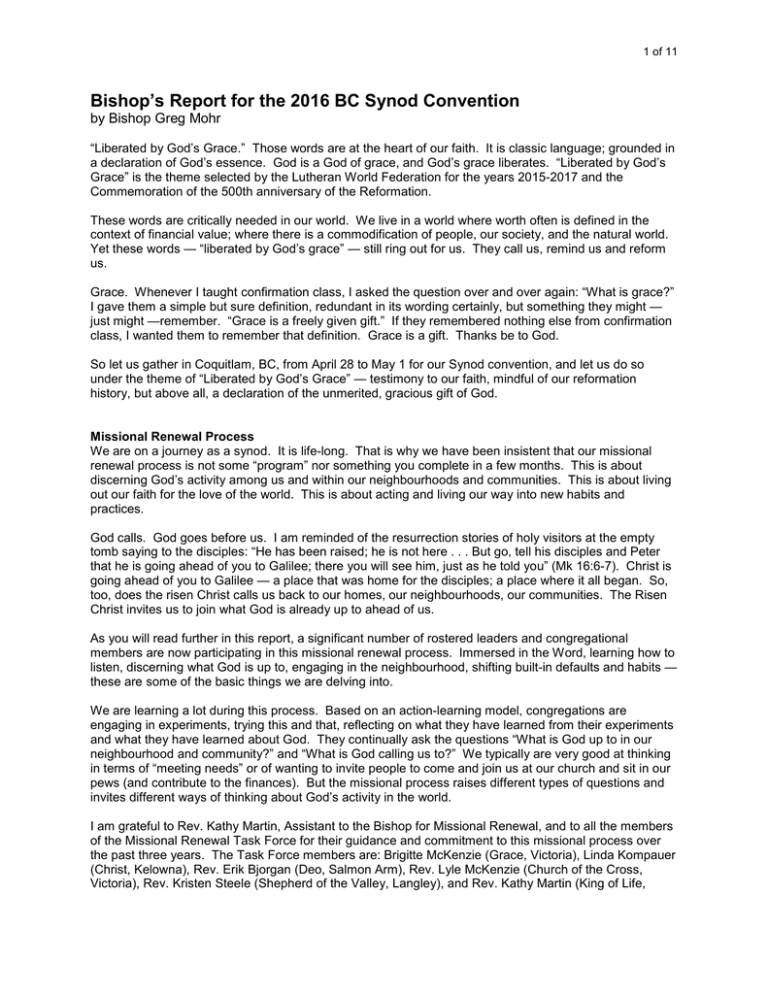
1 of 11 Bishop’s Report for the 2016 BC Synod Convention by Bishop Greg Mohr “Liberated by God’s Grace.” Those words are at the heart of our faith. It is classic language; grounded in a declaration of God’s essence. God is a God of grace, and God’s grace liberates. “Liberated by God’s Grace” is the theme selected by the Lutheran World Federation for the years 2015-2017 and the Commemoration of the 500th anniversary of the Reformation. These words are critically needed in our world. We live in a world where worth often is defined in the context of financial value; where there is a commodification of people, our society, and the natural world. Yet these words — “liberated by God’s grace” — still ring out for us. They call us, remind us and reform us. Grace. Whenever I taught confirmation class, I asked the question over and over again: “What is grace?” I gave them a simple but sure definition, redundant in its wording certainly, but something they might — just might —remember. “Grace is a freely given gift.” If they remembered nothing else from confirmation class, I wanted them to remember that definition. Grace is a gift. Thanks be to God. So let us gather in Coquitlam, BC, from April 28 to May 1 for our Synod convention, and let us do so under the theme of “Liberated by God’s Grace” — testimony to our faith, mindful of our reformation history, but above all, a declaration of the unmerited, gracious gift of God. Missional Renewal Process We are on a journey as a synod. It is life-long. That is why we have been insistent that our missional renewal process is not some “program” nor something you complete in a few months. This is about discerning God’s activity among us and within our neighbourhoods and communities. This is about living out our faith for the love of the world. This is about acting and living our way into new habits and practices. God calls. God goes before us. I am reminded of the resurrection stories of holy visitors at the empty tomb saying to the disciples: “He has been raised; he is not here . . . But go, tell his disciples and Peter that he is going ahead of you to Galilee; there you will see him, just as he told you” (Mk 16:6-7). Christ is going ahead of you to Galilee — a place that was home for the disciples; a place where it all began. So, too, does the risen Christ calls us back to our homes, our neighbourhoods, our communities. The Risen Christ invites us to join what God is already up to ahead of us. As you will read further in this report, a significant number of rostered leaders and congregational members are now participating in this missional renewal process. Immersed in the Word, learning how to listen, discerning what God is up to, engaging in the neighbourhood, shifting built-in defaults and habits — these are some of the basic things we are delving into. We are learning a lot during this process. Based on an action-learning model, congregations are engaging in experiments, trying this and that, reflecting on what they have learned from their experiments and what they have learned about God. They continually ask the questions “What is God up to in our neighbourhood and community?” and “What is God calling us to?” We typically are very good at thinking in terms of “meeting needs” or of wanting to invite people to come and join us at our church and sit in our pews (and contribute to the finances). But the missional process raises different types of questions and invites different ways of thinking about God’s activity in the world. I am grateful to Rev. Kathy Martin, Assistant to the Bishop for Missional Renewal, and to all the members of the Missional Renewal Task Force for their guidance and commitment to this missional process over the past three years. The Task Force members are: Brigitte McKenzie (Grace, Victoria), Linda Kompauer (Christ, Kelowna), Rev. Erik Bjorgan (Deo, Salmon Arm), Rev. Lyle McKenzie (Church of the Cross, Victoria), Rev. Kristen Steele (Shepherd of the Valley, Langley), and Rev. Kathy Martin (King of Life, 2 of 11 Coquitlam). As the tasks and responsibilities shift, others are being asked to work alongside the Task Force. In particular, a number of lay and clergy are being trained as coaches, so that they may assist congregational guiding teams and the clergy participants over the coming years. Appointment of Assistant to the Bishop for Missional Renewal With joy I was able to announce last fall that Rev. Kathy Martin (King of Life, Coquitlam) has agreed to serve as the new Assistant to the Bishop for Missional Renewal on a half-time basis. The congregation of King of Life has most graciously agreed to “share” Pastor Kathy with us and for that we are very grateful. As I reported in 2015 prior to leaving on sabbatical, each of the five ELCIC Synods received a large grant from the national church to assist in undertaking substantial mission initiatives within their respective synods. The Advisory Board for the ELCIC’s “Church Extension and Capital Fund” has provided $200,000 to each synod over a two-year period. The grants are received with the intent that they be used “in support of Canadian mission initiatives to participate in God’s mission in our changing context.” Synod Council approved a five-point strategy for the use of the funds from this CECF special grant. This strategy includes the following: 1. To hire a part-time Assistant to the Bishop for Missional Renewal. (The provision for appointing one or more Assistants when possible was made by the Synod in Convention in May 2014.) 2. To continue contracting with The Missional Network. 3. To provide honoraria as needed for additional resource people. 4. To provide travel and accommodation reimbursements for participants in the clergy cohorts and congregational guiding teams. 5. To use the remaining funds for such things as synod-implementation initiatives and experiments, workshops, and related equipment. Rev. Martin’s position involves a lot of organizing, administration, and meetings! But more than that, she also has unique gifts well-suited to the missional journey we are on as a Synod. Her abilities in facilitation, networking, training and pastoral care all come to the fore as she works with clergy cohorts and congregational guiding teams, and as she consults with other congregations who are in need of her insights and gifts. This past fall saw the beginning of a fourth clergy cohort and a third group of congregational Guiding Teams. In addition, we have begun providing resources to congregations not yet in the formal part of the missional renewal process but who desire some guidance as to their congregational ministry. Missional Renewal Process: The Journey So Far I asked Rev. Martin to prepare an overview of the scope of her work among us and to provide an update as to the Missional Renewal process in our Synod. As I read through her report, I am reminded time and again to offer a prayer of thanks for so many people across our Synod who have given of their time and interest in delving into this missional process. We are blessed by their ministry among us. Rev. Martin writes the following: th December 6 was the feast day of St. Nicholas. It also happened to be the day of my installation into this role of providing staffing support and oversight to the mission renewal process of our Synod. Nicholas had a reputation for secret gift-giving, hiding little gifts in unexpected places. People would discover them as they went about their day to day activities. That has been my experience as I have taken up this new role. In the most unexpected places there are tiny gifts. It 3 of 11 may be in the stories I hear from the congregational guiding teams, in the insight I hear from a colleague or an unexpected moment of grace in my own learning. I want to begin by my report by expressing my profound gratitude to Bishop Greg, Synod Council and the people of King of Life, Coquitlam, for the opportunity to serve our Synod in this way. For the past three years our BC Synod has been engaged in mission renewal under the guidance of Alan Roxburgh, Fiona Watts and The Missional Network. They have been teaching us practices that allow us to engage our communities and neighbourhoods in new ways. Together we are discovering the importance of listening carefully to our contexts. It is out of this careful listening that we begin to discover new opportunities to join with what God is up to in our particular neighbourhoods and communities. This has led congregations and rostered leaders into some very interesting experiments that allow us to develop new missional skills and capacities. I find the language of experiment very helpful. It allows us to become a community of learners discerning together how the Spirit of God might be guiding us forward into God’s hopeful future. At this point, there are four groups developing skills to attend to the adaptive challenges the church faces today. The learning cycle they engage is that of listening, experimenting, reflection and evaluation. Here is some information on each of these groups. Guiding Teams: This is a group of three to six people who provide leadership to the process in their congregation. They meet for a large group learning event approximately five times over an 18-24 month period. Providing oversight to this group is the Congregational Renewal Team or the CRT as they like to be known. This dedicated foursome (Brigitte McKenzie, Linda Kompauer, Vivienne Welters and Marilyn Steele) give countless hours to support the teams. In addition, we have seven coaches who work one-on-one with each guiding team. Vivienne Welters is now our lead coach and trainer. Across our Synod, 15 congregations have been or are currently engaged in the missional process. This includes guiding teams from Prince Rupert to Victoria, Prince George to Kelowna. We have already had several requests from congregations hoping to join the next learning cycle. Currently, our plans are that the final large group learning opportunity for congregations will begin in January 2017. After that date, learning will take place within smaller geographic areas with peers providing support. In consultation with the Missional Network we are developing a retreat this fall for the first two cohorts of guiding teams that will bring together church councils, guiding teams and their pastors for a day of learning. Clergy or Rostered Leader Cohorts: There are four groups (or cohorts) of rostered leaders who meet regularly to develop their missional skills and capacities. At the start of the process, rostered leaders are asked to engage in a 360 evaluation of factors related to mission. In consultation with Alan Roxburgh, each person identifies specific skills or adaptive challenges to address based on this 360. When they gather each month or two, the cohort members provide feedback and encouragement to one another. We have five rostered coaches who help lead this process: Lyle McKenzie, Kristen Steele, Erik Bjorgan, Eric Krushel, and myself. To date, 20 pastors have been or are engaged in a cohort. As with the Guiding Teams, the final large group process for clergy will begin in January 2017. After that date, learning will take place within smaller geographic areas. Synod Council: Throughout these past three years, The Missional Network has been working with our Synod Council and task force to help us consider what kind of synodical structure will best encourage, equip and support congregations and rostered leaders on this missional journey. To that end, Synod Council has given a portion of their meetings to these discussions and to continue our learning. 4 of 11 Joining Hope: We are using what we have been learning to provide an opportunity for congregations to begin some missional work in their local setting. This provides those who may not be able to fully enter the Guiding Team format a chance to begin the listening/discerning process. At this point, we are working with a couple of congregations. Area Ministry (future): As the Synod begins to develop ministry areas we will be trying a couple of experiments to see how we might gather around these missional practices. Can an area engage in experiments together? What might develop if congregational leaders gathered quarterly to learn together — congregational leaders as well as those who are rostered? This experiment will begin with a small group in a couple of regions. Scope: By my rough estimation we have just over 100 people actively engaged in a leadership role with this process in our Synod. Of course, there are many more when you consider all the people involved within the 15 congregations. Assistant to the Bishop for Mission Renewal: As the name implies, my role is to oversee and coordinate the implementation of the mission renewal process in our Synod. This means attending to all the cohorts (four groups of clergy, three groups of congregations); working with the Congregational Renewal Team to ensure that all the teams are meeting, supported and coordinated; teaching, coaching, writing or rewriting materials; meeting with individual guiding teams, clergy, and congregations; coaching the coaches...and the coaches to the coaches, etc.; designing processes for continued learning and reflection within our Synod; and attending to financials and budgeting. One of the early and ongoing tasks was simply to begin to catch up to all the material that had been falling off the sides of our desks as we tried our best to resource this process in the first few years. Training the Trainers: One of my tasks is to intentionally build capacity within our own Synod by training our own people. We now have good complement of people with skills to lead and train others. This is so helpful as we think about sharing the learning across our Synod and I look forward to the day when ‘missional’ is who we are as a Synod. The Missional Network: I meet somewhat regularly with Alan Roxburgh and Fiona Watts of The Missional Network. Their involvement has shifted from leading the sessions to helping us develop processes to continue to support those embarked on this journey in our Synod. Learning & Consulting: It is one thing to participate in the process, another to coach, and yet another to be expected to teach and field a variety of questions, etc. I discovered quickly that I need to be intentional about my own learning. Rev. Julianne Barlow serves in this same role in Alberta &Territories. In the interest of sharing resources, she and I have met a few times whenever our paths cross at other ELCIC events or when I am visiting family in Calgary. I had been invited by Bishop Elaine Sauer of the MNO Synod to make a couple of presentations on the missional work of our Synod and travelled there at the beginning of June 2015. Rev. Julianne and I collaborated on those presentations and that was another great learning experience. I have continued to be in touch with the MNO Synod as they move toward beginning this process in their synod. I had the opportunity to share something of our experience with our full communion partners in the Diocese of British Columbia on their Clergy Day at Bishop Logan’s invitation, and also have been a guest lecturer for a class at the Lutheran Theological Seminary in Saskatoon. I also appreciated the opportunity to attend the Mission Consultation in Winnipeg. Bishop Greg and I attended a Mid-Level Judicatory Denominational Leaders Gathering hosted by The Missional Network and the Parish Collective in Seattle. It was an opportunity to hear stories from other denominations — it seems that we are all experiencing similar challenges and this news was oddly freeing. 5 of 11 IT: I am working on the development of a blog / passcode protected area of our Synod website for Guiding Teams and Rostered leaders to share stories, questions and information. We also are looking for technology that will allow us to host a monthly discussion forum for Guiding Teams. It will be a way of sharing ideas, learning from one another and building community among our Synod. Synod Convention Learning Event – Craig Van Gelder: I first met Dr. van Gelder at the Mission Consultation in Winnipeg earlier this year, which I attended along with Mission Consultant Rev. Eric Krushel and two others from our Synod. Our BC contingent had opportunity to meet with Dr. Van Gelder to further plan our Synod Learning Day at this year’s Synod convention. I am very excited about what he has designed for our convention. Following the Synod Learning Event, there will be a short special session at the end of the day for all those who have been a part of a Guiding Team or Clergy Cohort. With Thanks: In closing, I want to say thanks again to Bishop Greg for his support, encouragement and guidance, to the Synod Executive, Kimberly and Robert for all their help as well as I have been finding my way in this new role. With great thanks to God! Pastor Kathy Martin Sabbatical Gratitude I want to express my deepest appreciation to the Synod for granting me a three-month sabbatical. The time away was exceptionally helpful, renewing, and affirming. I also want to express thanks to the other Synod Officers — Rev. Cliff Reinhardt, Darlene Johnson and Stephen Holmes — to the Deans and Assistants to the Deans from the six Conferences of our Synod, and to Synod office secretary Kimberly Bortnak. They looked after so many things while I was away, and for that I am extremely grateful. While sabbatical includes a fair amount of time just being away from the mantel of office, it also includes an educational component. To that end, during my sabbatical I undertook an executive leadership review that included a 360 survey and several sessions with a consultant exploring the implications of that survey. I also read books related to leadership and to the missional renewal process. Continuing Education The Assistant to the Bishop for Missional Renewal and I attended a Conference for Denominational Leaders in Seattle on February 18-20, 2016, as part of our continuing education. Sponsored by The Missional Network in collaboration with The Parish Collective, we discussed the adaptive challenges facing our denominations and explored what moving into the future might look like. It was good to sit around the table with leaders from other denominations and engage in conversation. There were representatives from United Methodist, Vineyard, Mennonite, Anglican, ELCA and ELCIC. It is important to realize that the concerns are the same across denominations. Even those denominations rumoured to be growing are experiencing closure of congregations, shrinking resources, and systems that are unable to meet the challenges facing us. Synod Convention and the Synod Learning Event Something new will take place during convention this year: a Synod Learning Event! Rather than spreading a guest speaker’s presentations throughout the convention schedule, we will experiment with holding a “Synod Learning Event” on Saturday, April 30. ALL ARE WELCOME to join with convention delegates for this Synod Learning Event at the Executive Plaza Hotel in Coquitlam. Rev. Dr. Craig van Gelder will be this year’s presenter/facilitator. He brings a wealth of experience and insight into the missional life of the church. Until his recent retirement, he served as Professor of Congregational Mission at Luther Seminary, St. Paul, MN. He will challenge us, call us and encourage us, as he leads us in 6 of 11 reflection, study, conversation, engagement and story. Throughout this day we will consider what it means that God is up to something in the world around us. We will explore who are we and what we are to be about. A flyer advertising this event was distributed to congregations in mid-March. Registration for the day is included in delegates’ registration package. However, we hope that many others will join us for the day; a registration fee of $25 will help offset some of the meal and refreshment costs. I encourage congregations to cover this cost for any who wish to come. While we are not in a financial position to provide travel equalization beyond those who are Convention delegates, I hope nonetheless that congregations throughout our Synod will be able to partake of this important event. Delegates attending the Synod convention will work hard on Thursday and Friday attending to the ministry and business of the convention. In addition to the reports of the Bishop, treasurer, secretary, National Bishop, seminary president, standing committees and others, there also will be the necessity to address proposed bylaw changes. These changes are intended to bring our synodical Constitution and Bylaws in line with decisions made by delegates to the 2015 National convention. Among other things, such changes include the switch to a three-year cycle for conventions and the implications this has for the election of Synod Council members and the Bishop; providing for the establishment of Ministry Areas, which is intended to replace the Conference structure; and creating the framework for the establishment of Synodically Recognized Ministries. There is another change that will greet convention delegates this year. The election of delegates to the 2017 National convention now must take place at the Synod Convention in the year preceding a National convention. National conventions will have a maximum of 150 delegates, which means that congregations no longer elect one delegate per congregation. Instead, Synod conventions are to select a synod’s delegates. We therefore need to do things differently at this spring’s Synod convention. However, our current Bylaws do not address this new situation. As a result, Synod Council adopted a policy to govern the process for the election of delegates to the 2017 National convention. This policy has been distributed to all congregations. It provides information on how nominations may be made, as well as how we as a synod will financially provide for the delegates to the National convention. The BC Synod is entitled to 17 delegates (9 Lay, 1 Youth, 7 Rostered), but the cost to send these delegates will be shared equitably across the congregations. The Nomination Committee’s report is included elsewhere in this Bulletin of Reports. There you will find the nominees for election of delegates to the 2017 National convention. Please review these biographical forms in advance of your attending the convention. Also note that nominations may be made from the floor of the convention. The Conference Deans Included elsewhere in the Bulletin of Reports are the reports of the Conference Deans. First of all, I want to state yet again how grateful I am for the dedication and commitment these Deans bring to our Synod ministry. Their insight and wisdom into the life of the church provides for fulsome conversation whenever we get together. Their willingness to attend to congregational issues on my behalf is exemplary. As you read the reports of the Deans, take note of contexts and activities described therein. These reports give you a glimpse into the life of their respective Conferences. They note the challenges yet also the opportunities experienced by our rostered leaders and congregations. Standing Committees At the previous Synod convention I reported on our need to undertake a major review of the Synod’s Standing Committee structure. Unfortunately, we have not been able to accomplish that task to date. Nonetheless, it still remains an important undertaking as we discern what committees, task forces or working groups might best support and enhance the ministry of our Synod. Such a review would take into 7 of 11 account human and financial resource issues, evaluate geographical realities, and study other parameters with respect to the make-up of committees, task forces or working groups. Synod Council will need more time to work on this process of review and to engage others from the Synod in conversation. However, Synod Council is bringing a recommended bylaw amendment to the Synod convention wherein the Standing Committee descriptions and tasks would be removed from the Bylaws and placed into the policy manual of Synod Council. This will provide for a more flexible and responsive approach to ministry in the Synod, and be adaptive to the changing dynamics of volunteerism. Truth and Reconciliation The Truth and Reconciliation Commission’s final report issued 94 Calls to Action. I strongly encourage you to read that document as well as the “United Nations Declaration on the Rights of Indigenous Peoples.” Please take a moment to read the ELCIC’s response to the Call to Action #48. It can be found at <http://www.elcic.ca/Documents/StatementonCalltoAction48.pdf> The 2015 annual Study Conference for Rostered Ministers welcomed Dr. Martin Brokenleg, who led us through presentation and conversation regarding the history of residential schools and the intergenerational trauma that ensued. He taught us much about the trauma, poverty and oppression that continues to exist. He called for each of us to enter a journey of “non-aboriginal decolonization,” wherein we self-reflect in order to lose “white innocence,” accept that historical violence occurred, and admit the full equality of aboriginal people and their ways. We have much to learn about reconciliation and right relations. I want to encourage you at the local level to seek ways of being in renewed relationships, to work for reconciliation and to transform practices. There are many resources available to us through the TRC’s website as well as the KAIROS website. New Congregation in the BC Synod! It was a joy to participate in the establishment of a new Shared Ministry within our Synod in the fall of 2015. Clearwater United Church applied to become a Shared Ministry following the protocols established in the Ecumenical Shared Ministry Handbook (accessible on the ELCIC website). Clearwater United has been in a two-way parish alignment with Barriere for many years, and continued to be in that relationship even when Barriere became a Shared Ministry a few years ago. They were quite taken with what that relationship meant and the witness it provided in the community; as a result, they petitioned the United, Anglican and Lutheran judicatories to establish Clearwater as a Shared Ministry. A worship service of Celebration was held Thursday, Sept 24, 2015, wherein the Shared Ministry agreement was signed by all three judicatories. Constitution and Bylaws: Province Amends Societies Act Revisions to the provincial Societies Act have been enacted by the government and take effect in the fall of 2016. All BC Societies will have two years to bring their constitution and bylaws in line with the new Act. Later this spring I will be convening a meeting of the Constitution sub-committee and of other interested people in our Synod to review the changes to the Societies Act and the implications this has for the Synod’s Constitution and Bylaws, the congregational Constitution and Bylaws, as well as for the Model Constitution and Bylaws for Congregations. While this year’s Synod convention will be attending to bylaw amendments as mentioned above, I suppose this serves notice that we will be reviewing further constitution and bylaw amendments in two years’ time with respect to these provincial changes to the Societies Act. On behalf of the Synod, Rev. Cliff Reinhardt (Secretary) recently attended an orientation session provided by the government, wherein they reviewed the significant changes to the Act. Some of the revisions include: on-line reporting; a change to the section on directors, including clarification regarding remuneration; only name and purpose will remain in the Constitution — everything else must be moved to 8 of 11 Bylaws; there will no longer be “unalterable” clauses and those that currently reside in the Constitution are to be moved to the Bylaws with the specification that they formerly were unalterable clauses. Some of you have struggled making changes to the Articles in your congregational Constitutions due to these unalterable clauses. The changes to the Society Act seem to have given us a mechanism to address some of those necessary changes. Development of Lay Academy The four western Synods and the Lutheran Theological Seminary, Saskatoon, are working together in the development of a Lay Academy. A working group has been formed to explore the rationale, values, needs and timelines. (Rev. Marlys Moen, Rev. Jennifer Wilson and I represent the BC Synod.) We also have begun a conversation as to the type of curriculum required and have noted that the Lay Academy also could accommodate some of the requirements outlined in the “ELCIC Policy Regarding Authorized Lay Ministry.” The working group has generated a resource database of prospective teachers/facilitators for the Lay Academy. A “needs assessment” questionnaire will be distributed to a number of congregations this spring to define the curriculum even further. The establishment of the Lay Academy is in response to the leadership needs of congregations and to the interest expressed by lay people for a comprehensive program of study. I believe that the development of the Lay Academy is vitally important as the church undergoes a shift in its human resources over the coming decades. Congregations are becoming smaller, which means that fewer of them will be able to support financially a full-time pastor. As a result, more pastors likely will be serving multi-point parishes. The means that there will be a shift in the role of pastor and the way in which congregations relate to one another. As a result, there needs to be an increased emphasis on lay education and training, so that these lay leaders may work in consort with the pastor in such a system. Such a shift also provides us with another opportunity to imagine, frame and implement another way of being church. Lutheran Theological Seminary I am extremely pleased with the work of Acting President Michael Nel as he leads our seminary through this very important transition time. His training and expertise in Bowen Systems Theory and in working as a consultant with synods and rostered ministers enables him to bring an experienced eye to some of the challenges facing the seminary. As this is only a two-year appointment, the Board of Governors has begun the formal process of a presidential search and a full review of its governance structure. Dr. Nel will be joining us for our Synod Convention and presenting the report of the Seminary. Refugee Sponsorships Many BC Synod congregations have become refugee sponsors or have explored becoming one. Some congregations have committed to sponsoring one or more families; some are still deciding. Many congregations are working collaboratively with other Lutheran congregations or church denominations (e.g. Southern Interior: six Anglican congregations and two Lutheran congregations are sponsoring a family of nine members). Fikre Tsehai (CLWR Refugee Office, New Westminster; their office is in the basement of the Synod Office house) indicates that he and the staff are very busy people right now! However, it is wonderful to hear so many stories of interest and commitment. Thank you, all, for exploring this important and life-changing ministry. Provincial Multi-Faith Council I have been participating in the organizing committee for a provincial Multi-Faith Council. Unlike other provinces, BC currently does not have a provincial multi-faith council. Such Councils are able to speak to governments and municipal leaders in a way that individual denominations or faiths are not able to do. The organizing committee currently includes members from the following faiths and denominations: Jewish, Muslim (including Bahai and Ismaili), Sikh, Hindu, Mormon, Roman Catholic, Pentecostal, 9 of 11 Lutheran, Anglican, and United. We are in the process of drafting a Memorandum of Understanding and continually seek to involve additional denominations and other faiths. Global Missions Update: Peru The Evangelical Lutheran Church of Peru (ILEP), our Companion Synod, has been experiencing significant challenges and conflict these past few years. I recently met with members of the Missions Committee to discuss our Companion Synod relationship with the church in Peru. We were provided with the latest information by Elina Singh regarding the turmoil that has embroiled that church. Elina serves as our BC Synod representative on the ELCIC Global Missions task force and also is a member of our Synod’s Missions Committee. The ILEP has undergone a split, but 8 of the 14 congregations continue on as a member church of the Lutheran World Federation and have changed their name from ILEP to that of ILP (The Lutheran Church in Peru). We are still studying what all of this might mean for our Companion Synod relationship and soon will be able to bring recommendations to our Synod. In the meantime, let us increase our commitment to pray for them. We hope that we soon will have some clarity as to how we might re-engage our companion relationship. At the meeting, we were reminded that the church in Peru prays for us regularly. Relationships are important. So let us also pray for them even more rigorously in light of their current situation. Reformation 2017: A Commemoration of 500 Years The Lutheran World Federation invites us to commemorate the 500th Anniversary of the Reformation during the years 2015-2017. I encourage you to make use of the many resources found on the ELCIC and the Lutheran World Federation websites. There you will find study documents, theological reflections and, of course, the Reformation Challenge. As a church, we have committed ourselves to an ELCIC Reformation Challenge that involves: 1. Sponsoring 500 Refugees to Canada; 2. Planting 500,000 trees; 3. Providing 500 Scholarships for ELCJHL Schools (Jordan and the Holy Land); and, 4. Giving $500,000 to the LWF Endowment Fund. The offerings received at the opening and closing worship services of our 2016 BC Synod convention will be designated for the scholarship portion of the Reformation Challenge. I encourage delegates to invite people from their congregations to send financial gifts with each delegate for this very important ministry. I have been in preliminary conversations with several Anglican and Roman Catholic bishops and their staff people as to what we might do in our various regions to commemorate this 500th anniversary in an ecumenical way. I trust that some exciting things will come of these conversations. In the same way, I hope that you will have conversations with neighbouring congregations to see what things you might do together to commemorate this historic occasion in your communities. Recently, I convened an ad hoc working group to begin planning some Synod-sponsored events in two or three regions of our Synod. We currently are seeking additional volunteers to assist us in this exciting task. Partnership in Ministry and Financial Resources The Treasurer’s year-end report was e-mailed to congregations at the end of January. Additional information is contained in the Bulletin of Reports. I encourage you to review these documents and to reflect on what your congregation’s “fair share” financial commitment might be with respect to your ministry as “the church-at-large.” Synod Council works very hard to keep our expenses as low as possible, but there are many things which we, as congregations and individuals of the Synod, seek to do. 10 of 11 At each successive Synod Convention, we all make decisions as to what our ministry priorities shall be and the congregational delegates vote on those proposed budgets on behalf of their congregations. There is a mutual accountability and responsibility when we make these decisions. I think it is important to remember that when we talk about the Synod’s budget we also are talking about the funds that are passed along through the Synod to the ministry of our seminary and the national church. In turn, some of these funds then go to participate in ministry around the world under the auspices of the Lutheran World Federation. As I was reviewing the financial situation of the Synod with the Treasurer recently, we both noted that many congregations face financial challenges. Yet we also noted that so many seek to give generously to the broader work of the church and for that we are thankful. Each congregation’s constitution and bylaws makes it clear that we are committed to work together with other Lutheran congregations in our BC Synod and Evangelical Lutheran Church in Canada. Perhaps the best way to picture this is to think of the ministry of the BC Synod as being an extension of your very own congregational ministry. So, too, is the ministry engaged by the ELCIC an aspect of your own congregational ministry. The two million refugees being cared for at camps operated by the Lutheran World Federation are part of your congregational ministry. The schools being operated by the Evangelical Lutheran Church of Jordan and the Holy Land are an extension of your congregational ministry. Closer to home, the Canadian Lutheran Anglican Youth Gathering and the Synod’s Confirmation Camp are part of your congregational ministry. So, too, is the providing of mission support dollars for congregations engaged in special initiatives part of your congregational ministry, just as is the use of “compassionate justice” funds for congregations engaged in food security, community engagement, and other justice endeavours. In the same way, the worship resources you use and the Augsburg Fortress curriculum for confirmation and Sunday School are made possible through your congregation’s offerings. The friendly voice on the other end of the phone when you call Synod office (I’m talking about Kimberly’s voice, not mine) is part of your congregation’s ministry. And when you need a reimbursement cheque mailed back to you just as quickly as possible, Robert is able to do that since he is an extension of your congregation’s ministry. The same is true as I travel around the Synod visiting with pastors and congregations or when I spend hours each day on the phone with pastors, congregational chairpersons or other church leaders. I do so as an extension of your congregational ministry, for we are partners in ministry. As Paul reminds us, we are connected one to another in this body of Christ, and when one suffers we all suffer together, and when one rejoices we all rejoice together. We are partners together in ministry, and to that we must say, “Thanks be to God.” With Gratitude First of all, I want to express my deep appreciation to Kimberly Bortnak, Synod Office secretary, for assisting us during Rachel Genge’s maternity leave, and then for agreeing to serve our Synod on a permanent part-time basis following Rachel’s move. Kimberly provides gracious hospitality to all who visit, and radiates a joyfulness in all her work. Some of you also have come to know our bookkeeper, Robert Hampel, over these many years. Robert demonstrates a faithful, steady approach to his work and life, and has at his fingertips no shortage of data, information, and reports as required. I also want to lift up the work of the Officers of the Synod — Treasurer Stephen Holmes, ViceChairperson Darlene Johnson and Secretary Rev. Cliff Reinhardt. They undertake many tasks on your behalf, are diligent and faithful in their service, and have deep and abiding sense of faithfulness and commitment to their Lord and to God’s ministry in our world. Darlene and Pastor Cliff both will be stepping down from their positions on Synod Council this year, as each of them has served in their capacities for eight years and are ineligible for further re-election. Their gifts, wisdom and insights will be deeply missed. 11 of 11 Expressions of gratitude also must be extended to all who have worked tirelessly in preparing for this Synod convention: our Convention Manager and Assistant Manager, Joanne Solomonson and Angela Chorney; the lay people and pastor of Good Shepherd Lutheran Church, Coquitlam, who serve as hosts for this convention; and for all others from various congregations in the lower mainland who have offered to provide leadership and assistance. We thank you for your service to our Synod. Lastly, I want to thank each of you for the opportunity I have been given to serve as your Bishop. I am grateful for your partnership in ministry and our journeying together in this thing we call the BC Synod. May God continue to bless your ministry in your congregations — and in your neighbourhoods and communities. In Christ’s service, +Bishop Greg Mohr
